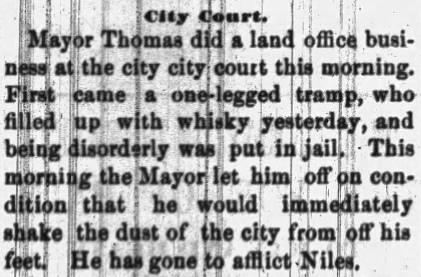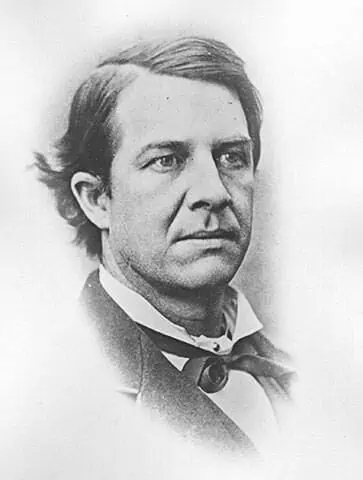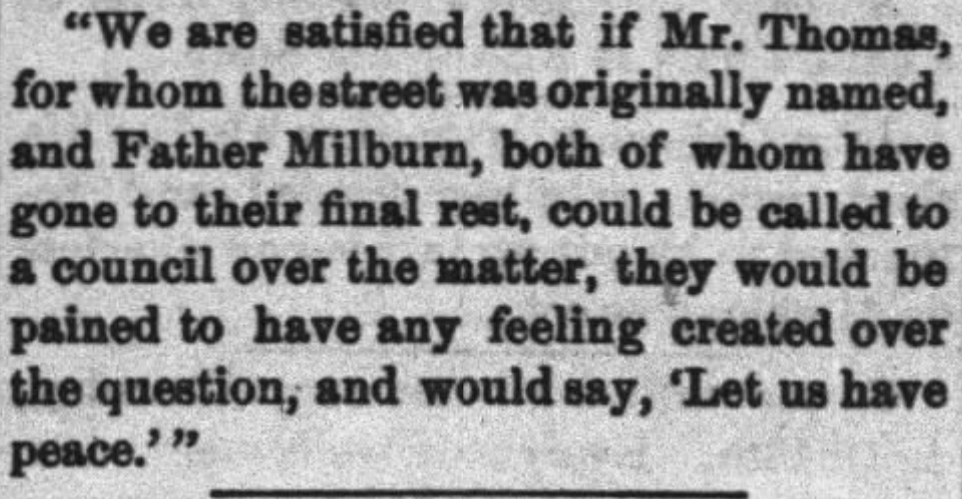Alexander Napier Thomas died on March 26, 1904, at the age of 64. Complications from a lifelong struggle with diabetes had felled him in his home. Businesses closed throughout his city to honor the man. Mourners lined up to gaze into his coffin and to look upon his face one last time. His obituary remembered him as affectionate, indulgent, charitable, noble and excellent.

But none of that reverence was to be found in South Bend, where Thomas had once been the city’s fourth mayor, and where a pair of streets were named in honor of his family.
The newspapers of South Bend were either unaware of Thomas’s death or maybe they just weren’t interested. For whatever reason – and there doesn’t seem to be a good one – South Bend had made many attempts to forget the man since the last time he took the train out of town.
* * *
As the Independence Day celebration boomed through the Philadelphia night sky, perhaps Alexander Napier Thomas was startled from his mother’s womb by the sound of the explosions. He was born a day later – July 5, 1839. Thomas would grow up along with the nation he was born into, a pioneer son to a pioneer family, with sights firmly set on the frontier lands of northern Indiana.
By the middle of the 1850s, the Thomases had come to South Bend and established themselves as a leading family in a community that had yet to incorporate itself as a city. They built a homestead on the near west side of town and dedicated a pair of roads to mark their property lines, claiming proud family names to mark the paths. Today’s Thomas and Napier streets surround the place where the family used to live.
By 1862, with the Civil War raging and looking unlikely to end as quickly as had once been hoped, Alexander Thomas enlisted to fight, joining the 73rd Indiana Infantry and rising to the rank of lieutenant colonel. The unit saw plenty of action, including battles at Perryville and Stones River, before Thomas and more than 1,500 other Union soldiers were taken captive in Rome, Georgia, after a failed raid on a railroad line.
Fortunately for Alexander Napier Thomas, his side ended up winning the war and he was able to return to South Bend in 1865. He quickly married Adeline, began work as a real estate agent, became involved in Republican local politics and built a home for his young family on Lafayette Street.
A decade later, he was elected mayor of his city and served a single term from 1876 to 1878. The work of the mayor’s office was different than it is today, and much of Thomas’s term was spent reading the riot act to malfeasant drunks who occasionally caused mischief in the city:

Clipping from the South Bend Tribune; May 18, 1876.
One gets the sense that Thomas did not find this kind of work completely satisfying. Besides his decision not to run for a second term, there were also signs that he was tiring of life in South Bend more generally. His family spent a few weeks in Washington, D.C., around the nation’s centennial, and Thomas spent much of the second half of his term traveling to the pioneer lands of the new west of Kansas and Nebraska.
Something out west must have awakened Thomas’s pioneer instinct, because just a few years after magnanimously abdicating his mayoral seat, he had moved out of South Bend for good, settling in Aurora, Nebraska; and making the same kind of name for himself that he had in South Bend. Twenty years after he’d been the mayor of South Bend, Alexander Napier Thomas was elected among the first mayors of Aurora.

Perhaps the people of South Bend had felt an affront when Thomas abandoned the city that had given him his first political success. By 1884, less than two years after Thomas had left South Bend for good and in the bright new glow of the opening of Milburn Chapel, there was a movement underway to strip Thomas Street of its name and to rechristen it as Milburn, named after the same Studebaker in-law who the beautiful new church had been named after. Despite remonstrances and protests, the measure passed, and the road was renamed on February 12, 1884.
But it was far from a done deal.
Angry protests would continue for months. The Thomases even made a return trip from Nebraska to fight the ruling. Finally, just as the city teetered on the edge of fiery chaos, there came word that a legal loophole had been discovered. Apparently, according to an arcane but superseding state law, there was no legal recourse for South Bend to change the names of any roads that had been placed and named in the years before South Bend was incorporated as a city. This included both Thomas and Napier Streets.
It might have seemed in this moment of legal euphoria that Thomas Street had been restored, but the commissioners, for no known reason, decided to dig in their heels. Alexander Thomas, who had already fought in one Civil War and was not eager to for a second, sought a truce; but his name carried little weight in this new South Bend.
But where Thomas’s voice faltered, the voice of Clem Studebaker would certainly carry. In a generous letter that would prove to preserve the city, Studebaker settled the debate once and for all. Thomas Street would remain:

Reprint of Clem Studebaker’s letter; South Bend Tribune; April 8, 1884.
His street remained, but the whole ordeal might have soured Thomas on South Bend. By any account, it doesn’t appear that he ever returned. Alexander Napier Thomas is buried in Aurora and recognized as one of the city’s founding fathers, but there are no streets named after him there.
Aaron Helman is an author, adventurer and historian from South Bend. He thinks South Bend, Indiana, sounds better than Aurora, Nebraska. His books are available at aaronhelman.com.
